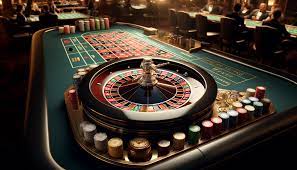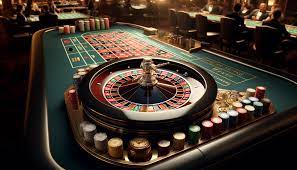Understanding the Odds in Online Roulette Games
Online roulette has become a staple in the world of online gaming, attracting players with its vibrant wheel and the thrill of potential winnings. It is a game of chance that combines simplicity and excitement, making it immensely popular among both seasoned gamblers and newcomers. The various versions of roulette, including European, American, and French, offer unique twists and betting options, ensuring that there is something for everyone.

Understanding how online roulette operates is crucial for players looking to enhance their gaming experience and increase their chances of winning.
Introduction to Online Roulette
Online roulette is a digital adaptation of the classic casino game. Players place bets on a spinning wheel divided into numbered pockets. Each pocket is either red or black, with a single or double zero depending on the variation. The simplicity of the game lies in its straightforward rules and the excitement that comes from watching the wheel spin. Different variations of roulette are available online, including:
- European Roulette: Features a single zero and offers better odds for players.
- American Roulette: Includes both a single and a double zero, increasing the house edge.
- French Roulette: Similar to European but with additional betting options and rules like ‘La Partage’.
Each version presents unique strategies and payouts, making it essential for players to familiarize themselves with the specific rules of the version they choose to play. The mechanics behind online roulette involve random number generators (RNGs), which ensure the outcomes are fair and unpredictable, simulating the experience of playing in a physical casino.
Understanding Roulette Odds
The concept of odds in roulette is pivotal for players seeking to make informed betting decisions. Odds represent the likelihood of a particular outcome occurring and are crucial in understanding the potential returns on bets placed. There are notable differences in odds between European and American roulette due to the presence of the double zero in the latter.
- In European Roulette, the odds of winning on a straight-up bet are 1 in 37.
- In American Roulette, the odds are slightly worse at 1 in 38.
The house edge, defined as the advantage the casino has over players, plays a significant role in determining player odds. In European roulette, the house edge is approximately 2.7%, whereas in American roulette, it rises to about 5.26%. This difference can significantly impact long-term player profitability.
Types of Bets in Roulette
Players can place a variety of bets in roulette, each offering different odds and payout ratios. Understanding these bets and their potential returns can enhance gameplay strategy and decision-making. The two primary categories of bets are inside and outside bets:
- Inside Bets: Placed on specific numbers or small groups of numbers. These bets have higher payouts but lower odds of winning. For example:
- Straight-up bet: 35 to 1 payout
- Split bet: 17 to 1 payout
- Outside Bets: Cover larger groups of numbers. These bets have better odds but lower payouts. For example:
- Red or Black: 1 to 1 payout
- Odd or Even: 1 to 1 payout
| Type of Bet | Payout Ratio | Odds of Winning |
|---|---|---|
| Straight-up | 35 to 1 | 2.63% |
| Split | 17 to 1 | 5.26% |
| Red or Black | 1 to 1 | 48.65% |
| Odd or Even | 1 to 1 | 48.65% |
Strategies for Playing Roulette
Players often employ various strategies to maximize their winnings while playing roulette. Popular betting systems include the Martingale strategy, where players double their bets after each loss, and the Fibonacci strategy, which follows a sequence of numbers to determine bet amounts.
- Martingale Strategy: A system designed to recover losses by doubling bets after each loss.
- Fibonacci Strategy: Utilizes a numerical sequence to calculate bet sizes, aiming to minimize losses.
Effective bankroll management is equally important, allowing players to maintain control over their gambling habits. Setting limits on losses and wins helps keep the game enjoyable rather than detrimental. Understanding the balance between risk and reward is essential for any betting strategy, as it influences the potential for both wins and losses.
The Role of Randomness in Roulette
Randomness is a fundamental aspect of online roulette, affecting the outcomes of each spin. The use of random number generators (RNGs) ensures that results are unpredictable, replicating the randomness of a physical roulette wheel. This randomness can significantly influence betting decisions and strategies.The implications of RNG technology in online gaming are profound, as they guarantee fair play. Players must recognize that every spin is independent, and previous outcomes do not affect future results.
Understanding this randomness is key to making informed betting choices rather than relying on patterns or streaks that may be perceived.
Common Myths About Roulette
There are numerous myths surrounding online roulette that can mislead players. Common misconceptions include beliefs about winning streaks and the idea that certain numbers are “due” to hit after a series of losses.
- The myth of “hot” or “cold” numbers suggests that some numbers are more or less likely to win based on previous outcomes, which is false in a game of chance like roulette.
- Another common myth is the idea that players can predict outcomes based on previous spins, which can lead to erroneous betting strategies.
Real-life examples demonstrate that each spin is random, and relying on these myths can result in significant losses.
Responsible Gambling Practices
Setting limits is crucial for maintaining a healthy approach to online roulette. Players should establish clear boundaries concerning time and money spent on the game.
- Setting Limits: Define a budget for gambling activities and stick to it.
- Time Management: Allocate specific periods for playing and avoid extended sessions that may lead to poor decision-making.
Resources are available for players seeking help with gambling issues, including hotlines and support groups. Engaging with these resources can provide necessary support and help maintain control over gambling habits.



